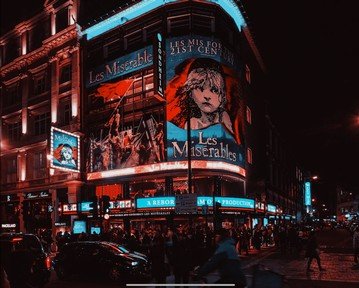The musical's Prologue starts with a chorus of prisoners singing about their hard life working in a chain gang, in the song
. One of the men, Jean Valjean is let out on parole, but is warned by one of the guards, Javert, that he is still not a free man. Valjean has trouble finding work and in desperation steals some silver from a kindly bishop. When he is captured, he is astonished when the bishop tells the police that the silver was a gift. Overcome by the bishop's kindness in giving him a second chance, he sings
and vows to change his life for the better. He breaks his parole, making himself a hunted man.
Act 1
Eight years later, Valjean has used the bishop's gift wisely, and risen to become a factory owner and mayor of a small town. A group of factory workers and paupers sing the chorus
about their lives of drudgery. One of the women, Fantine, is revealed to have a secret child, and is sacked from her job. Fantine sings the song
about how her youthful romantic hopes have all been destroyed. Desperate for money, she is forced to sell her body and joins the other whores down by the docks. The whores and sailors sing about their lives in the ironic chorus
. Fantine gets into a fight with an abusive sailor and is arrested by Javert, who is now a police officer.
Soon afterwards, Valjean hears that an innocent man has been wrongly identified as him and is about to go to prison in his place. In the dramatic solo song
, he realises he cannot allow this to happen, and reveals his true identity in the courtroom. Before he can be thrown back in prison, he and the dying Fantine sing the duet
, in which he promises her that he will find and look after her daughter, Cosette. After a dramatic duet with Javert entitled
, he escapes and goes to find Cosette.
Cosette is lodging with an innkeeper and his wife, the Thénardiers, who treat her as little more than an unpaid servant. She sings a wistful solo (
) about her dreams of a better life, while the Thénardiers celebrate the various ways they cheat their customers in the raucous song
.
Valjean finds Cosette fetching water and takes her back to the inn. He reveals that Fantine is dead, and bargains with the duplicitous Thénardiers in the song
to take Cosette off their hands for 1,500 francs.
Another nine years pass. Valjean and Cosette are now in Paris, which is in a state of political turmoil. A group of beggars sing the chorus
, warning about how close the people are to revolting against their oppressors.
The Thénardiers are in Paris too, running a gang of thieves. They attempt to rob Valjean and Cosette, but are foiled by Javert, who is now a Parisian Inspector of Police. During this encounter, Cosette and the student Marius see each other for the first time and instantly fall in love. As Valjean flees, Javert recognises him again, and in a powerful solo,
, sings of his belief that he is doing God's work in hunting down the fugitive ex-prisoner.
Marius joins a group of students who are planning their part in the coming revolution. Despite being distracted by thoughts of Cosette, he joins in their colourful and rousing song
, looking forward to the coming fight. When the street urchin Gavroche arrives to tell them of the death of General Lamarque, they decide that the time has finally come to rouse the people to revolt, in the thrilling chorus
.
Meanwhile, Éponine (the Thénardiers' daughter) brings Marius to meet Cosette again. Marius and Cosette sing again of their love in the romantic duet
, although Éponine, who also secretly loves Marius, is heartbroken.
Fearing he is about to be recaptured, Valjean prepares to flee Paris with Cosette. Marius decides it is his duty to stand with the other students and join the uprising. Javert and the Thénardiers also have plans, and in
, the big dramatic finale to Act One, all the main characters anticipate their roles in the coming revolution.
